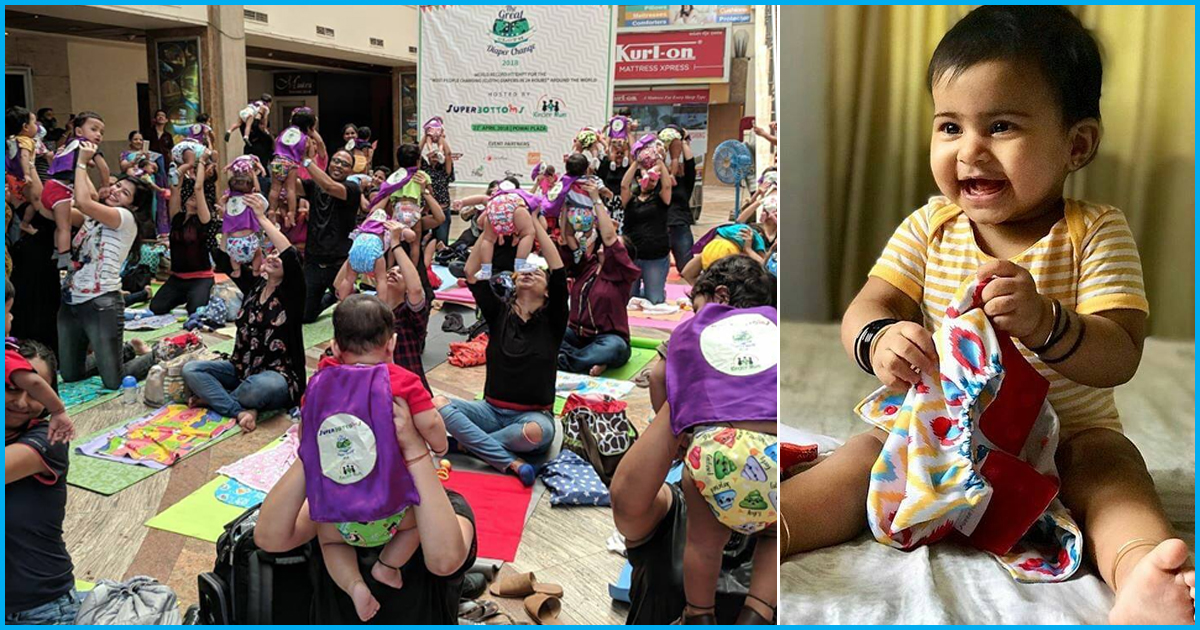
This Eco-Friendly Diaper Brand Has Been Providing Parents With A Sustainable Diapering Option In The Goodness Of Cloth
5 Jun 2018 3:37 AM GMT
Much like any other disposable sanitary products, your baby’s diaper poses more threat to the environment than you might think. The problem is twofold, not only do they burn a hole in your pocket, but spoils the environment in more than one way – landfills being the primary concern.
Even though it may appear that an individual child may not contribute all that much to landfills, an article by Small Footprint Family suggests that one baby wearing disposable diapers create about 908 kilograms of waste in two years. That is 908 kgs of toxic, non-biodegradable waste generated by a baby in a couple of years. Such environmental damage can be stopped if parents choose to switch to cloth diapers which are non-toxic as well as environment friendly.
There is an increasing amount of push-back from the world over with regards to usage of single-use plastic that is not only harmful to human life, but to both aquatic and land animals as well. It takes upto 1000 years for plastic to decompose in landfills and its safe to say that this toxic, non-biodegradable product has been creating menace ever since its inception.
With most Indian states cracking down heavily on the usage of plastic, on this World Environment Day, the onus lies upon the users to eliminate the its use in daily life, only to opt for a more sustainable alternative.
Similar concerns over the environment as well as her baby’s health led Pallavi Utagi, a Mumbai based mother to discover international cloth diaper brands which were sustainable and eco friendly alternatives to disposable diapers.
Talking about her experiences, Pallavi said, “When I discovered my baby son had diaper rashes, it was a scary scene. Most of all, I was guilty. Diaper rashes can do that to moms — using diapers feels like a shortcut and that’s what happened to me.” This, coupled with her husband’s environmental concerns, led Pallavi on her entrepreneurial journey.
However, she felt that the international cloth diapers that she had been using for her baby weren’t enough, since she felt that they do not fit the needs of an Indian baby. Her quest to find an alternative prompted Pallavi to launch her own company, Superbottoms, which provides eco-friendly options to mothers when it comes to diapers. Superbottoms were made to suit Indian babies with desi designs, dry-feel, and more importantly super trim crotch.
As opposed to normal disposable diapers which contains a mixture of chemicals that do the absorbing, Superbottoms is composed of multiple layers of organic fabric along with a dry-feel layer which keeps baby skin dry. The outer layer, which is laminated keeps the diaper waterproof as well.
Interestingly, cloth diapers are cheaper than one might think. From the sustainability point of view, cloth diapers can help save upto 70% in nappes when compared to disposable ones. A child needs around 5500 disposable diapers in three years which tantamounts to a total of Rs. 1.5 lakhs, whereas, only 16 cloth diapers can sustain for three years. These numbers indicate the fact that not only are they light on the pocket, but reduces one’s carbon footprint significantly.
What started out as a mother’s concern has now spilled over in the form of a large social media network of mothers, with similar concerns. Superbottoms, a company largely run by mothers like Pallavi has been educating parents about the benefits of modern cloth diapers by engaging in a number of methods including social media, paediatrician reach out, meetups and more.

What is interesting is that since there is no Child Product Safety norms in India, Superbottoms went ahead to get their products tested as per US safety standards of CPSIA.
Not only does it have a ‘Try For Free’ policy for first-time users, but also a dedicated cloth diaper helpline run on WhatsApp too for all parents with queries about sustainable diapers. This helpline is managed by parents themselves.
Using cloth diapers instead of the commonly used disposable ones requires a bit of persuasion in first-time parents and that is the challenge the company faces. The company through its numerous campaigns seeks to spread awareness about the usability and eco-friendliness of cloth diapers.
In a world where the issue of landfilling and sanitary waste has become a serious concern, Superbottoms, with their eco-friendly diapers envisages to offer an eco-friendly alternative and relieve the environment of landfills, one diaper at a time.
 All section
All section















